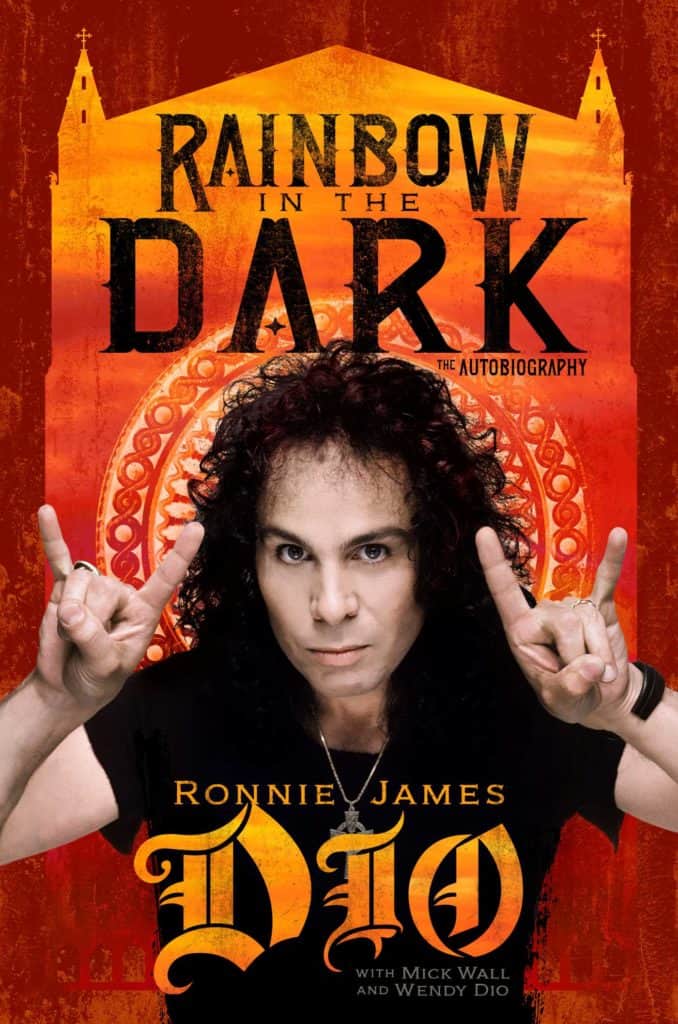In a tribute to the great James Cagney as he was set to receive the American Film Institute’s Lifetime Achievement Award, its presenter, George C. Scott, paid Jim the ultimate compliment, asserting: “he was what he seemed to be.” There was little need for guessing when it came to Jim, and that sentiment also rings true for the late heavy metal icon Ronnie James Dio.
Rainbow in the Dark: The Autobiography of Ronnie James Dio (Purchase Here) chronicles his life in his own words, revealing an inner world that was already known to many. Those who knew him continue to attest to the consistency of Ronnie’s character, noting that he was as kind to his friends as to his fans; and those of us who didn’t know him felt ourselves to be his kin. And that’s what I appreciated most about this book: feeling even closer this man whom I admire.
If you’ve followed Ronnie’s career, this book will rarely ever leave you surprised, but that’s what made Ronnie great: his life itself was an open book. His connection with his fans meant that he was unusually honest with them. And this book further reinforces that great link. Growing up in a no-nonsense household, the audience is taken through the early years with his strict father. As much as you wanted to dislike him, you wound up feeling grateful for his authoritative parenting. If life is a series of inconsequential moments interspersed with those of destiny, then that moment wherein Ronnie’s father forced him to play an instrument instead of baseball belongs in the category of the latter. Ronnie’s grandmother, on the other hand, was surely the source of his warmth and generosity. And together, they helped mold him.
Wendy notes Ronnie’s great storytelling ability, and it’s evident as he takes you through his trials. Like me, Ronnie hated change. But, the great king always stood toe to toe with the monsters in his path. First, the horrendous car accident that left Ronnie badly wounded and killed his best friend Nicky. Then, the struggles of being heard and taken seriously. As most musicians, Ronnie had to continuously fight for his vision. And great opportunities quickly devolved into toxicity. Sparring against the pressure for commercial success, Ronnie left Blackmore’s Rainbow. And then creative differences led to a split with Black Sabbath. But, Ronnie never relented.

An artist’s determination and confidence in his conceptions are the catapults of his success. And Ronnie wanted anything but to just be another rock star. The man who hated change was both stubborn and adaptive, ebbing and flowing with life’s tides while persisting to chase his dream, the epitome of existential paradox. Ronnie refused to write love songs or to conform to pop culture. He wrote epics as opposed to ballads, and fortunately it didn’t take long for the public to finally grasp the wisdom of his sagas.
Rainbow in the Dark provides us with a glimpse into Ronnie’s fantastical mind and, more importantly, with a blueprint on how to live and love. Alongside the accident, one of the other difficult aspects of the book pertained to his band Dio. Flowing as he tended to, Ronnie handled the band’s partial dissolution with grace, despite how much it pained him to let go. Fundamentally, his autobiography is a primer on cognitive flexibility, which is one’s ability to handle life’s changes and challenges with confidence and poise. If Ronnie truly disdained change, you couldn’t tell from his confrontations with it; the essence of a king.
I appreciated the book ending at the height of his career, peaking when Dio headlined Madison Square Garden in 1986. The kid from Upstate NY, who would circle around the Garden hoping to some day see his name in lights, finally made it big. In my favorite song of his, Hungry for Heaven, Ronnie sings about a dreamer who wills his way to fame through grit and courage, and the book’s final chapter is aptly eponymously titled. It was simply the perfect ending.
As George C. Scott remarked about James Cagney, “I wish to god I knew him better.” So many of us will never get to meet Ronnie, but this book creates an enduring chain, which his openness makes possible. I’ll think of Ronnie each time I find it difficult to adapt to change and whenever I’m told that my creative vision will never work. I’ll hold onto his music as a reminder that something great isn’t often popular. And remind myself that my hunger for recognition is intertwined with character-building struggle. While so many of us are hungry for heaven, we forget that we often need a little hell.